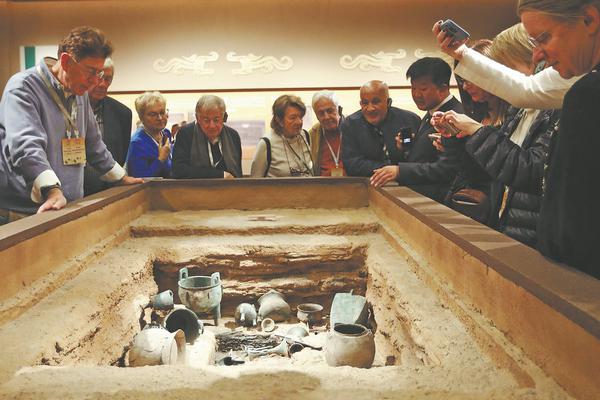 |
 |
 |
 |
 |
 |
 |
 |
 |
 |  |
 |
 |
 |
 |
 |
 |
 |
 |
 |
 |
 |
 |
|
Measure's comprehensive approach to boost heritage development in new era  A group of foreign professionals appreciate relics at the Yinxu Museum, Anyang, Henan province, on Nov 5. (Photo by KAN LI/CHINA NEWS SERVICE) Following years of thorough and systematic amendments, the newly revised Law on Protection of Cultural Relics is set to take effect on Saturday, signifying a new era of legal governance in the protection of China's cultural heritage. According to the National Cultural Heritage Administration, revising the law was an important step in turning proven practices into legal regulations. It also strongly supports the modernization of the governance system and capabilities in the field of cultural relics. In November, the Standing Committee of the National People's Congress, China's top legislative body, approved the revision. This is the second time the law has been updated since it was introduced in 1982; the first time was in 2002. Chen Xingcan, a member of the 14th National Committee of the Chinese People's Political Consultative Conference and also president of the Archaeological Society of China, said the revision will meet the needs of the cultural relics sector's development in the new era. The newly revised law consists of eight chapters and 101 articles, with very detailed and specific provisions, which Chen said reflects the central government's great emphasis on the protection of China's cultural heritage. "The law is very detailed and resembles a regulatory document. This revision is both comprehensive and systematic, and it may not require such large-scale amendments for the next 10 years or so," said Chen, who has participated in the law's two revisions. The veteran archaeologist added that President Xi Jinping has given many instructions on the protection of cultural relics and emphasized the importance of protecting the relics on many occasions. Since the 18th National Congress of the Communist Party of China in 2012, Xi has toured more than 100 historical and cultural locations and issued many instructions related to cultural relics and archaeology. He said that historical and cultural heritage is a valuable resource that is neither renewable nor replaceable, and its protection should always be given top priority. Xi also said that we must properly handle the relationship between urban reconstruction and development and the protection and utilization of historical and cultural heritage, and ensure that urban development and heritage protection are well coordinated. In 2022, reflecting the president's guidance, the nation's new principles of cultural relic work were released. These put protection first and urge enhanced management, value exploration and effective utilization, call for making cultural relics "alive", and aim to promote a deep integration of cultural heritage protection with modern society. The new law added articles saying that before starting construction in old urban areas or large-scale land development projects, a survey of cultural relics must be done first. For land that might contain underground cultural relics, archaeological surveys and explorations must be completed by law before the local government sells or makes plans for the land. "It's a milestone revision that will greatly aid future archaeological work. Many cultural heritage sites have disappeared during urban development in the past decades," said Chen. The veteran archaeologist said that without legal protection, his team's archaeological work was often obstructed by developers and residents in the past. Now the entire society places high importance on cultural relics and heritage. This is significant progress and a reflection of our respect for our own history and culture," Chen said. |
广告合作(Contact Us)|关于我们|小黑屋|Archiver|哈密尔顿华人网
GMT-4, 2025-5-17 05:40
Powered by Discuz! X3.5
© 2001-2025 Discuz! Team.